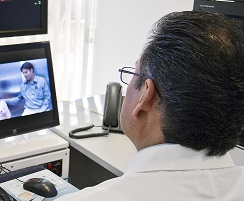
This is an archive of an Office of Justice Programs blog. This page is no longer updated and may contain outdated information and links that no longer function.
Giving Victims of Sexual Assault the Care They Need
Thursday, October 5, 2017
By Alan R. Hanson, Acting Assistant Attorney General

A 2011 study from the Centers for Disease Control and Prevention found that 1 in 5 women and 1 in 58 men were raped in their lifetimes. One of the many tragedies of sexual assault is that most victims do not report the crime to law enforcement.1
Some don't go to police because they are in shock or denial about what happened, or they want to attempt to put the trauma behind them. Others may fear that they won't be believed. Of course, reporting the crime to law enforcement is an essential first step to bringing the attacker to justice.
The report leads to an investigation, which requires the victim to undergo a highly invasive medical examination to collect and preserve any evidence related to the assault. It typically takes 2 to 5 hours. The forensic examination gathers critical evidence for testing, commonly known as a rape kit, which may be used to corroborate a patient's testimony during a criminal investigation.
But what if the victim lives hundreds of miles from the nearest hospital that employs a registered nurse who has completed specialized education and training to provide forensic examinations to sexual assault patients? What if the emergency room nurse who treats her, while concerned and wanting to conduct the best exam possible, sees only a few patients each year who have suffered a sexual assault? What if this nurse lacks experience in conducting these forensic exams?
Sexual assault patients require compassionate, victim-centered care to ensure that their needs are met. The Office of Justice Programs' Office for Victims of Crime looked at this situation and decided to do something about it by using a technique known as telemedicine.
In telemedicine, or telenursing, technology connects the onsite clinician to an experienced Sexual Assault Nurse Examiner. In this way, the trained nurse can answer questions and guide the person performing the exam in real time on procedures, patient care and support, evidence collection and documentation. Research shows that using a SANE to conduct forensic examinations contributes to higher prosecution and conviction rates.2 Further, an evaluation by the University of California???Davis shows that telemedicine has been used frequently in cases of child sexual assault and has resulted in improved overall quality of exams.
In collaboration with the National Institute of Justice, OVC has funded a pilot project, the National Sexual Assault TeleNursing Center through the Massachusetts Department of Public Health. Established in 2014, NTC is the first center to provide remote expert consultations by trained nurses to clinicians caring for adolescent and adult victims of sexual assault.
Through this program, SANEs provide telemedicine consultations to six sites in rural and/or underserved areas across the country, including two naval hospitals, a health care center for Native Americans, and rural hospitals. NTC provides real-time patient care support and ongoing training through live video interface to these sites 24 hours a day, every day of the year.
Evaluations by those who have received NTC's telenursing consultations rated the overall quality 5.5 on a scale where 6 is the highest. And the program enables onsite nurses to increase their experience and develop their skills.
Based on NTC's success, OVC late last year funded the start of a second program, a state-wide effort managed by Penn State University that will use telemedicine technology to enhance access to quality forensic care for adult and adolescent victims in underserved communities throughout Pennsylvania. A pending grant will bring the total of OJP funding for both of these telemedicine initiatives to $8.9 million.
I am proud that OJP is investing in these resources, and I am proud of OVC's innovation in using telemedicine to make the best tools available to help victims of sexual assault. This is all part of OJP's role to help cities, states and tribal communities tackle their public safety challenges.
Ultimately, higher-quality evidence will lead to successful investigations, prosecutions and convictions. I believe that not only will the telemedicine program help victims deal with the trauma of sexual assault, ultimately it will mean safer communities for all of us.
1 See Bureau of Justice Statistics, National Crime Victimization Survey, Concatenated File, 1992-2015, (U.S. Department of Justice).
2 See generally Cameron S. Crandall and Deborah Helitzer, December 2003, Impact Evaluation of a Sexual Assault Nurse Examiner (SANE) Program, Washington, DC: U.S. Department of Justice, National Institute of Justice; and Rebecca Campbell et al, January 2009, Systems Change Analysis of SANE Programs: Identifying the Mediating Mechanisms of Criminal Justice System Impact, Washington, DC: U.S. Department of Justice, National Institute of Justice.

